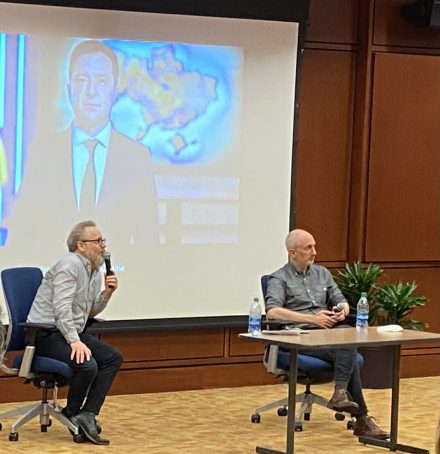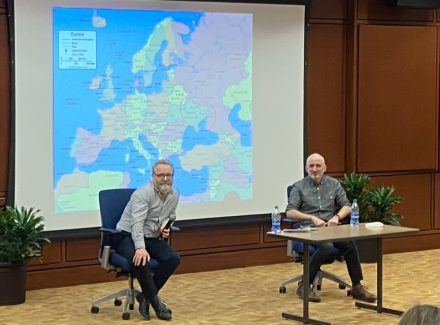Preeminent scholars of Russian politics, Samuel Greene and Graeme Robertson discuss Russia’s invasion of Ukraine.

Due to the escalating conflict between Russia and Ukraine, Elon students, faculty and staff were invited to attend a moderated discussion, “Understanding the Conflict between Russia, Ukraine, and ‘the West’” on Monday, Feb. 28 in LaRose Digital Theater. The event was hosted by the Department of Political Science, the International and Global Studies Program and the Peace and Conflict Studies Program.
Samuel Greene, professor of Russian politics and director of the Russia Institute at King’s College, London, and Graeme Robertson, professor of political science and director of the center of Slavic, Eurasian and East European studies at UNC-Chapel Hill, gave insight into the current situation.
The discussion opened with an explanation about Ukraine’s independence from the Soviet Union in 1992. Robertson explained that Ukraine had nuclear weapons left over from the Soviet Union and agreed with the United States, Russia and western Europe to give them up in return for security guarantees and recognition of its sovereignty.
Many people are struggling to understand how this conflict could benefit Russia, Greene said, and it’s important to understand how Russian president Vladimir Putin thinks in order to find an answer.
“I think if we’re going to get one, we need to very carefully try, as uncomfortable as it might be, to see both the demands and incentives of internal Russian politics and the demands and incentives of international relations the way that Putin does,” Greene said. “Otherwise, we’re going to get this wrong again.”
Russia struggled economically in the late 1990s after the collapse of the Soviet Union. As the country was getting back on its feet in the 2000s, Russia started to see NATO expansion as a growing threat to the country’s security and there was rationality behind Russia’s fear, Robertson said.
“They started saying in 2007, 2008, that the current setup in Europe was unacceptable and that NATO expansion was a threat to their security,” Robertson said. “You can kind of understand this from a very simple logic of a security dilemma. If NATO is coming closer and moving troops closer and moving weapons closer, why are they doing it if they do not have hostile intent?”
A pivotal moment in understanding this conflict is in 2008 when Ukraine and Georgia, also a former Soviet state, were invited to join NATO. Russia acted immediately, invading Georgia which “effectively killed stone-dead any possibility of Georgia getting into NATO,” Robertson said.
In the Euromaidan demonstrations which lasted from November 2013 until February 2014, Ukraine overthrew a government that preferred integration with Russia over integration with western Europe. The leadership was replaced with one that was pro-European Union and pro-NATO, to which Russia also acted quickly, annexing Crimea from Ukraine in order to prevent the peninsula from becoming a part of NATO. This annexation began an ongoing war in eastern Ukraine.
Another key piece to understanding Russia’s conflict with the west is that Putin blamed uprisings in former Soviet countries on the U.S. and western Europe, claiming that any demonstrations were initiated by the west to threaten Russia. Putin is dependent on this narrative of conflict with the west because Russia’s economy greatly struggled after the global financial crisis and has since never recovered.

“The legitimacy of his regime increasingly depends upon this idea of conflict with the west and of his entourage and himself being defenders of Russia as a ‘besieged fortress,’ is the term you’ll see used,” Robertson said. “They needed a new formula and this formula of conflict with the west presented itself at a good time,” Robertson said.
The problem with this narrative is that it has real consequences. Ukrainian citizens have been killed and displaced. Russian citizens, mostly young men, who have been sent to fight in Ukraine, are dying. The Ukrainian government claims that 7,000 Russian troops have died so far, although Russia disputes this number.
“If Putin had wanted to push Ukraine into the Western Alliance and away from Russia, his behavior over the last 10 years has been making that happen,” Robertson said.
Greene and Robertson both said that this conflict was going poorly on Russia’s end.
“It clearly hasn’t gone quite to plan,” Greene said.
Ukrainians have shown that they are willing to fight for their country and Russians are protesting the war in about 50 to 60 cities across the country.
“It’s a moment of a different understanding of who Russia is on the European stage and what kind of actor Russia could be, and quite frankly, it makes me very sad,” Robertson said.


